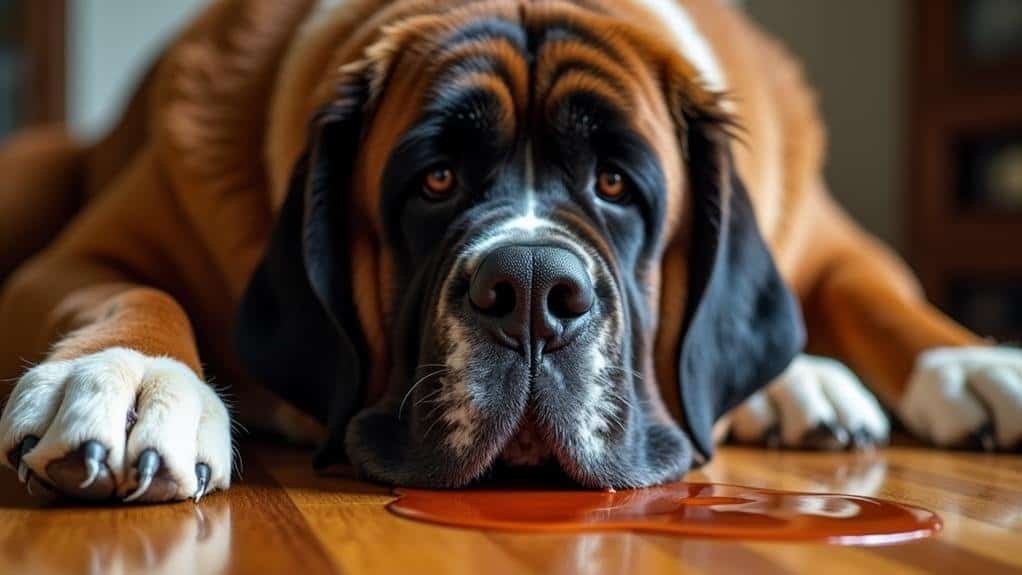Your dog's excessive drooling could be due to various factors. While some breeds naturally drool more, sudden or persistent slobbering may indicate health issues. Common causes include dental problems, nausea, heat stroke, or oral irritations. Brachycephalic breeds and large dogs with loose jowls are prone to drooling. If your pup's slobbering is accompanied by other symptoms like bad breath, lethargy, or difficulty eating, it's time to consult a vet. Maintaining good oral hygiene and monitoring your dog's environment can help prevent excessive drooling. Understanding the underlying reasons can help you better care for your furry friend's health.
Normal Vs. Excessive Drooling
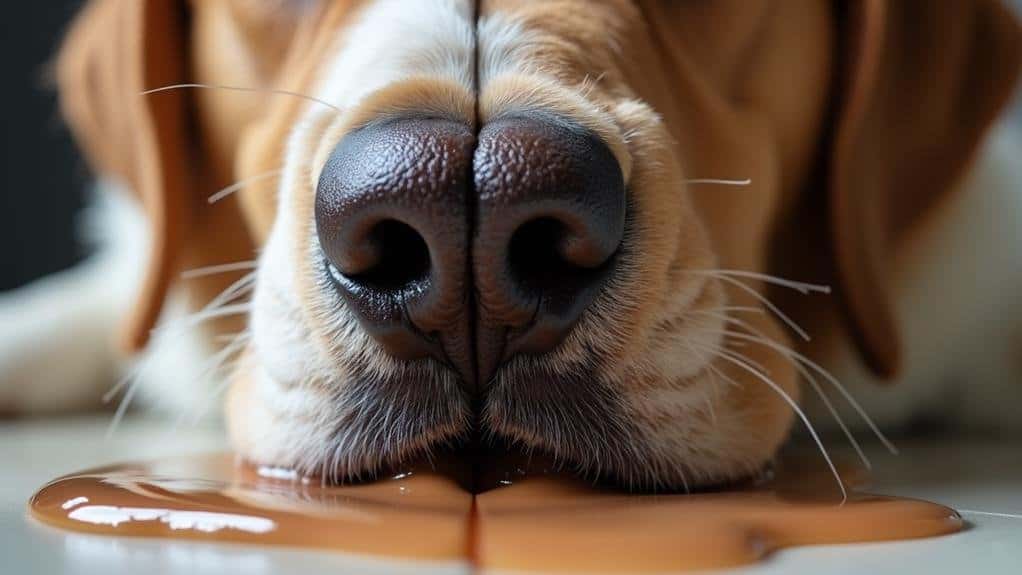
A puddle of drool on the floor doesn't always spell trouble. It's vital to understand the difference between normal and excessive drooling in your dog. While some breeds, like Bulldogs and Mastiffs, naturally produce more saliva due to their facial structure, excessive drooling can indicate underlying health problems.
Normal drooling often occurs during mealtime or when your dog smells enticing food. However, if you notice your pup drooling excessively in situations unrelated to these triggers, it's time to pay attention. Excessive drooling, or ptyalism, happens when saliva production surpasses your dog's mouth capacity. This can be caused by various factors, including dental disease, foreign objects lodged in the mouth, or gastrointestinal issues.
Monitoring your dog's drooling patterns is important for early detection of potential health issues. If you observe significant changes or persistent excessive drooling, it's necessary to seek veterinary treatment.
Common Causes of Hypersalivation
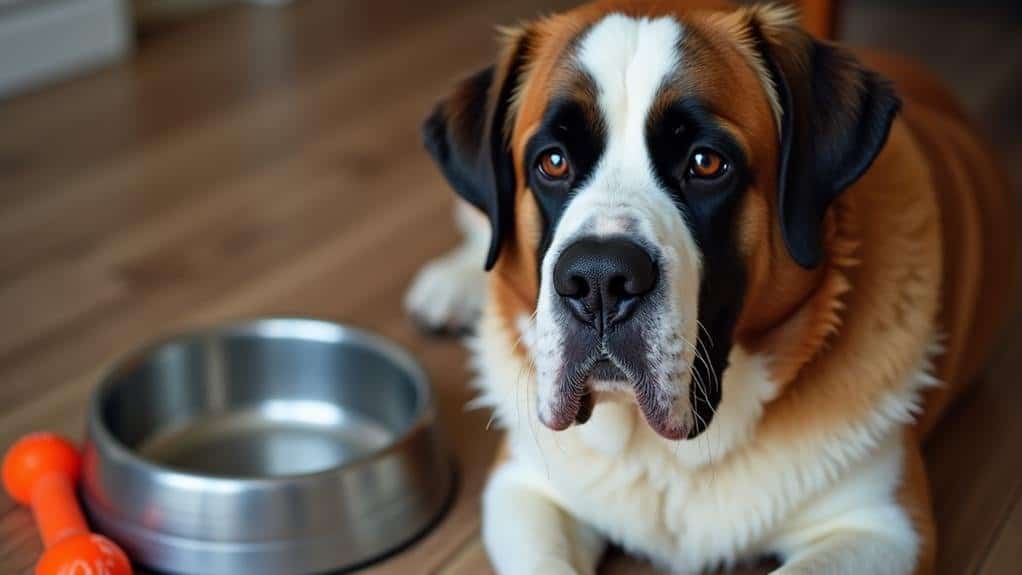
Identifying the root causes of hypersalivation is vital for addressing your dog's excessive drooling. Dental issues, such as gum disease or tooth fractures, can trigger pain and discomfort, leading to increased saliva production.
If you notice bad breath alongside the drooling, it could indicate foreign objects lodged in your dog's mouth, causing irritation and slobbering.
Nausea, often experienced during car rides or after ingesting toxic substances, can manifest as excessive drooling. Watch for other symptoms like lip licking and vomiting.
In hot weather, be alert for signs of heat stroke, which can cause hypersalivation as your dog tries to cool down through panting. If you observe distress alongside drooling, seek immediate veterinary attention.
More serious underlying conditions, such as oral cancer or masses in the mouth, can also cause excessive drooling. These issues may be accompanied by difficulty eating and halitosis.
Regular veterinary check-ups are vital for early detection of these health concerns. If you're worried about your dog's excessive drooling, don't hesitate to consult your vet to rule out any serious issues and guarantee your pet's well-being.
Breed-Specific Drooling Tendencies
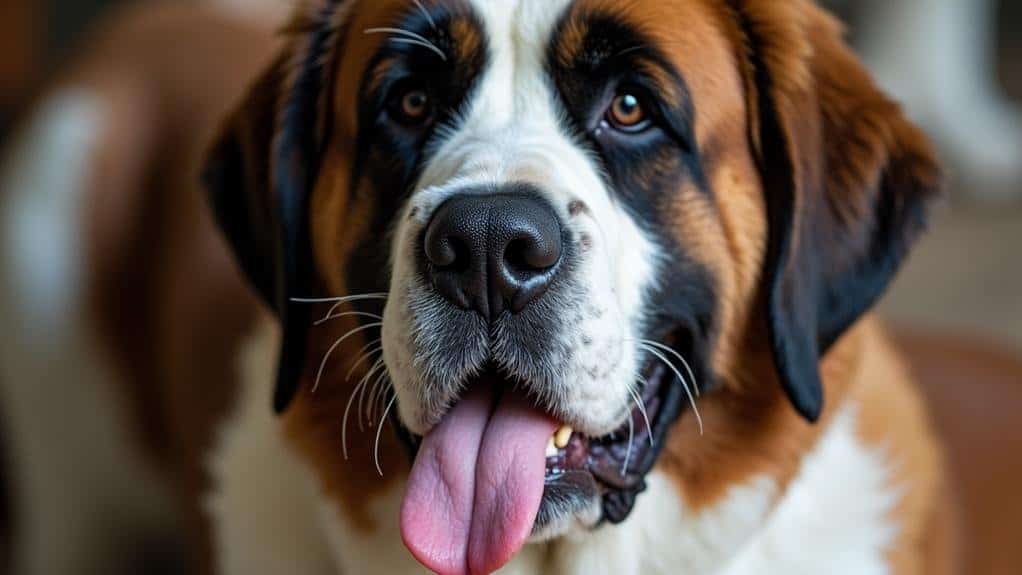
Four distinct breed categories are known for their excessive drooling tendencies.
First, large breeds like Mastiffs, Saint Bernards, and Newfoundlands are genetically predisposed to drool due to their loose skin and mouth structure. These dogs often produce copious amounts of saliva, which can accumulate and drip from their jowls.
Second, breeds with shorter snouts, known as brachycephalic dogs, such as Bulldogs, tend to drool more because of their unique facial anatomy. Their compressed mouth structure makes it challenging to contain saliva effectively.
Third, scent hounds like Bloodhounds are prone to excessive drooling due to their loose skin and droopy lips, which allow saliva to pool easily.
Lastly, many breeds may drool excessively when anticipating food or treats, which is considered normal behavior rather than a health concern.
As a dog owner, it's essential to understand your breed's specific tendencies.
This knowledge will help you distinguish between normal drooling and potential health issues that may require veterinary attention.
Health Issues Triggering Slobbering
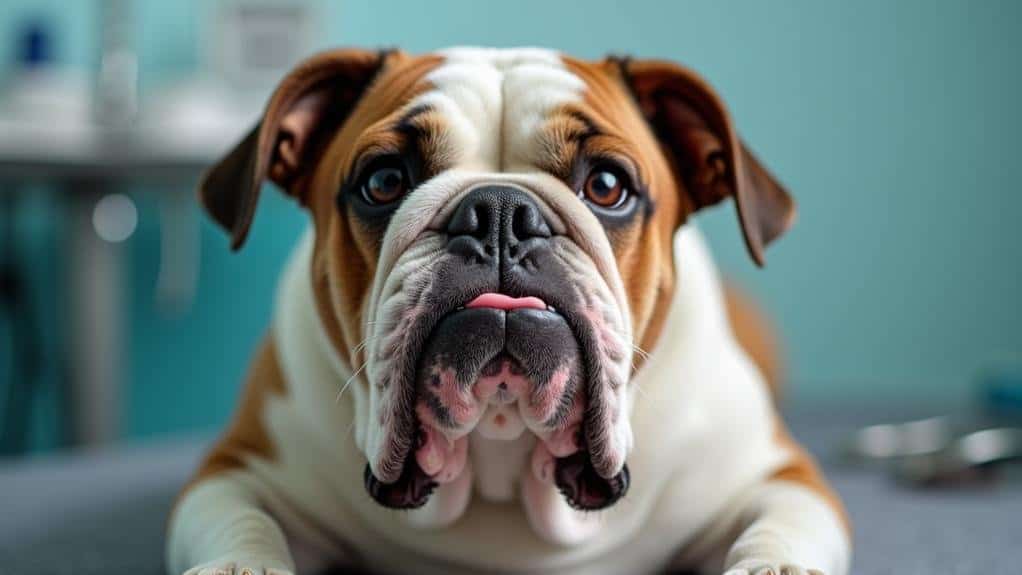
Understanding the health issues that trigger excessive drooling in dogs is important for pet owners. Excessive drooling, or hypersalivation, can be a sign of various underlying conditions that require your attention.
Dental diseases, such as gum disease and tooth fractures, can cause pain and increased saliva production. If you notice your dog slobbering more than usual, it's essential to take into account potential health problems.
Here are four common health issues that can trigger excessive drooling in dogs:
- Foreign objects lodged in the mouth
- Ingestion of toxins, especially insecticides
- Oral cancer or masses
- Liver disease, leading to conditions like hepatic encephalopathy
Be alert for signs accompanying excessive drooling, such as bad breath, discomfort while eating, or difficulty drinking.
If you suspect your dog has ingested toxins or has a foreign object in its mouth, seek immediate veterinary care. Regular dental check-ups are important for early detection of oral cancer and other issues affecting saliva production.
When to Consult a Veterinarian
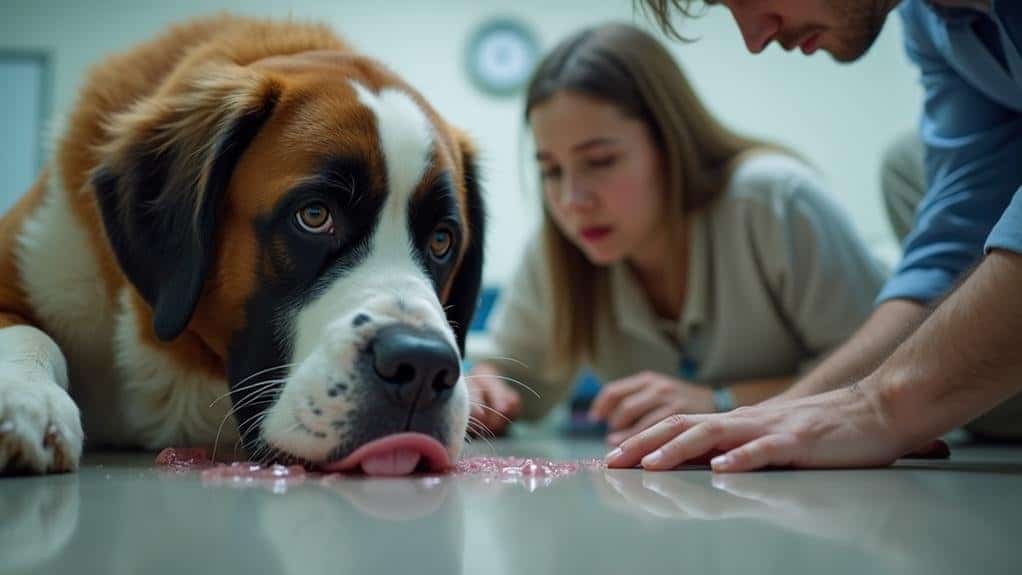
While recognizing health issues is important, knowing when to seek professional help is equally vital. If your dog's excessive drooling persists beyond a few hours, it's time to consult a veterinarian. This is especially important if the persistent drooling is accompanied by vomiting or diarrhea, which could indicate underlying conditions.
Pay close attention to signs of pain, such as whining or a reluctance to eat. These symptoms should prompt you to seek immediate veterinary consultation to rule out serious issues.
Changes in behavior, including lethargy or agitation alongside drooling, are concerning and warrant a vet visit for further evaluation.
Don't ignore swelling in the mouth or face, as this requires immediate veterinary attention to address potential emergencies.
If your dog is displaying excessive drooling along with breathing difficulties or signs of distress, it's crucial to get prompt veterinary care.
Managing and Preventing Excessive Drooling
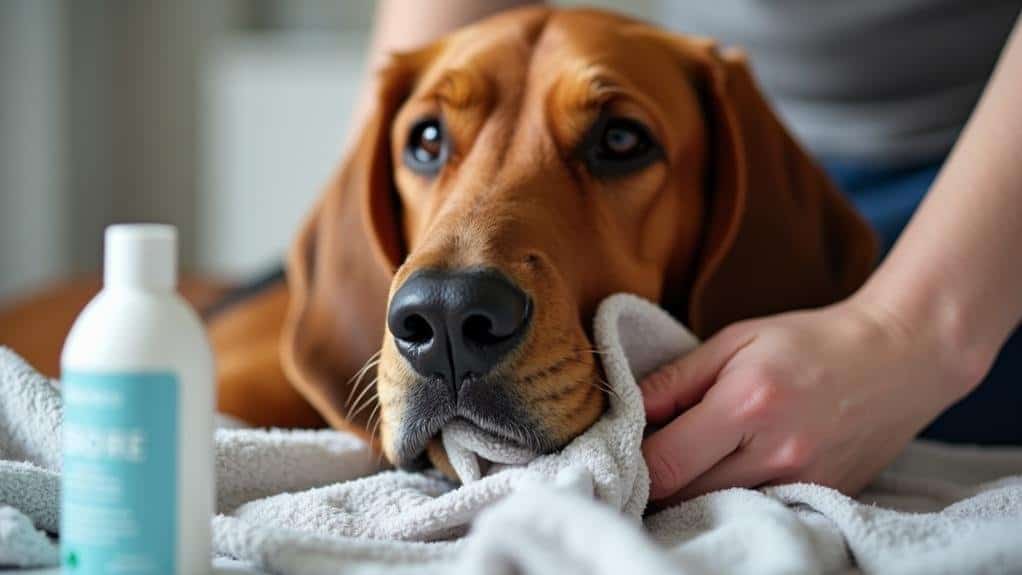
To effectively manage and prevent excessive drooling in dogs, it's crucial to implement a thorough care routine.
Focus on maintaining your dog's oral health through regular dental check-ups and daily tooth brushing. These preventive measures can greatly reduce the risk of dental disease, a common cause of excessive drooling.
Monitor your dog's chewing habits and provide safe toys to prevent foreign object ingestion, which can lead to increased saliva production.
Keep your pet away from trash and avoid giving table scraps to minimize the risk of poisonings or gastrointestinal distress that may cause drooling.
Here are four key strategies to help manage and prevent excessive drooling:
- Confirm proper hydration and regulate your dog's temperature, especially in warm weather.
- Create a calming environment to manage stress-induced drooling during travel or exposure to loud noises.
- Schedule regular dental check-ups and maintain a consistent oral hygiene routine.
- Supervise your dog's chewing habits and provide appropriate toys to prevent foreign object ingestion.
Frequently Asked Questions
Why Did My Dog Suddenly Start Drooling Excessively?
Your dog's sudden excessive drooling could be due to dental issues, foreign objects in the mouth, nausea, or serious conditions like heatstroke or neurological disorders. It's essential you consult a vet immediately, especially if other concerning symptoms arise.
When Should I Be Concerned About My Dog Drooling?
You should be concerned about your dog's drooling if it persists for hours, especially with other symptoms. Watch for pain signs, behavior changes, swelling, or breathing difficulties. If you notice these, don't wait—contact your vet immediately for guidance.
How to Treat Excessive Drooling in Dogs?
To treat excessive drooling in dogs, you'll need to identify the cause. Consult your vet for a proper diagnosis. They may recommend dental work, remove foreign objects, prescribe medications, or develop a treatment plan for underlying conditions.
Is Excessive Drooling in Dogs an Emergency at Night?
Yes, excessive drooling in dogs can be an emergency at night. You should seek immediate veterinary care if it's accompanied by other symptoms or persists for hours. It could indicate serious health issues requiring prompt attention.
Conclusion
You've now got a better understanding of why your dog might be drooling excessively. Remember, some slobbering is normal, but if it's sudden or excessive, it could signal an underlying issue. Keep an eye on your pup's drooling habits, consider their breed, and watch for other symptoms. If you're concerned, don't hesitate to consult your vet. With proper care and attention, you can help manage your dog's drooling and guarantee their overall health.

